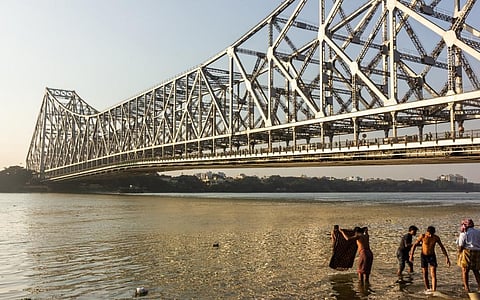

The 10 West Bengal cities, recently ranked as the dirtiest among Indian cities with over 100, 000 people, have fared poorly in waste processing, remediation of old dumpsites, cleanliness of water bodies and public toilets, in addition to segregation of waste at source, the detailed scorecard of the assessment carried out by the Union Ministry of Housing and Urban Affairs has showed.
Kolkata has been ranked as the 9th dirtiest city among 446 Indian cities with a population of more than 100,000. Howrah, across the Ganga, was ranked as the dirtiest on the same benchmark.
“This report is biased. It is meant to malign the image of West Bengal and push private agencies in the waste management of Kolkata and rest of the state,” alleged state municipal affairs and urban development minister, as well as Kolkata mayor, Firhad Hakim to this reporter.
He claimed that the reality is different: “So many people have come to the city in recent times and applauded its cleanliness.”
An official, however, accepted that the state’s decision not to formally join the survey might have contributed to the poor rankings.
Incidentally, in September 2022, the National Green Tribunal had imposed a penalty of Rs 3,500 crore on the West Bengal government for its poor performance in waste management, particularly for failing to plug the huge gap in solid and liquid waste generation and treatment.
West Bengal cities, not included in the earlier survey, fared poorly on several accounts.
Sixteen cities from West Bengal were assessed overall in the survey. Baidyabati and Tarakeshwar, both in Hoogly district on the western fringe of Kolkata, were found to be the cleanest in the state. They were followed by Champdani in Hoogly and Katwa in Purbo Bardhaman districts.
Kolkata, with an overall score of 11 per cent —1,050.6 out of 9,500 — has been ranked 9th in the state and 9th dirtiest in India. West Bengal’s capital was ranked 4,387 among 4,477 cities considered overall for the study, irrespective of their population size.
The report card, a copy of which is with this reporter, shows Kolkata scored ‘zero’ per cent in parameters like ‘waste generation vs processing’ and ‘cleanliness in public toilets’. It obtained only 13 per cent in ‘remediation of dumpsites’, 24 per cent in ‘source segregation’ and 27 per cent in ‘cleanliness of water bodies’.
The city did better in ‘door to door collection’, ‘cleanliness in residential areas’ and ‘cleanliness in market’, receiving 89, 77 and 76 percentages respectively. The survey considered eight parameters overall.
Howrah did poorly on all parameters, with ‘door to door collection’ (48 per cent) getting the highest score. Overall, on average among all 16 cities assessed, cleanliness in market and residential areas were best (69.2 per cent). ‘Door to door collection’ followed with 68.6 per cent.
‘Waste generation vs processing’ had the worst score (zero per cent), followed by ‘remediation of dumpsites’ with 10.9 per cent. Poor maintenance of water bodies also contributed to overall state performance, with only a 40.5 per cent score.
Incidentally, West Bengal cities have also done poorly in the cleanliness assessment of Ganga cities, occupying 13 out of 16 bottom rankings. Dhulian and Haldia were ranked second and third from the bottom nationally. Chhapra in Bihar was labelled the worst in the category.
“The assessment seems ambiguous; and, does not reflect the actual status of West Bengal cities in waste management. Take the example of Kolkata. Strangely, the city was given ‘zero’ in waste processing despite it running a 500 metric tonne (MT) plant to convert biodegradable waste to manure. Kolkata recently added another 500 MT plant for processing construction and demolition waste,” noted Arunabha Majumdar, a retired director and head of the All India Institute of Hygiene and Public Health. He is also a waste management expert.
“Getting zero in cleanliness of toilets is unacceptable as many of them are maintained by private agencies and in reasonably good shape. Even a survey of state urban development department has confirmed the status. However, it is a fact that several of the around 400-odd ‘pay and use’ toilets in the city are not in good condition,” said a senior civic body official in Kolkata.
“We have started remediation of old dumpsites in many cities of the state including Kolkata. For example, we have already processed 1.8 million MT of waste in Dhapa out of around 73 MT being dumped there. Though more work needs to be done here, still a 13 per cent score for Kolkata in this sector is not a correct assessment,” pointed out a senior official from the state urban development department.
Sujoy Chakraborty, chairperson of the board of administrators in Howrah city, also claimed that the city’s waste management has been much better than reflected in the study and that it does not deserve the last position in the country. “I do not know the actual score card but how can we get zero in waste processing when we are running a waste treatment plant in our Belgachia dump yard?” he asked.
“The results only reflected the study findings,” countered a Union government official involved with the study, refusing to be named.
“Though there may be question marks about few of the numberings, we cannot completely deny the markings as clearly the emphasis in the state, particularly Kolkata city, is to keep the major thoroughfares and key neighbourhoods clean. Moreover, the Waste Management Act of 2016 has been largely flouted,” explained a waste management expert belonging to a city-based nonprofit.
“The score about the cleanliness of water bodies is a true reflection of the situation in Kolkata,” claimed another.